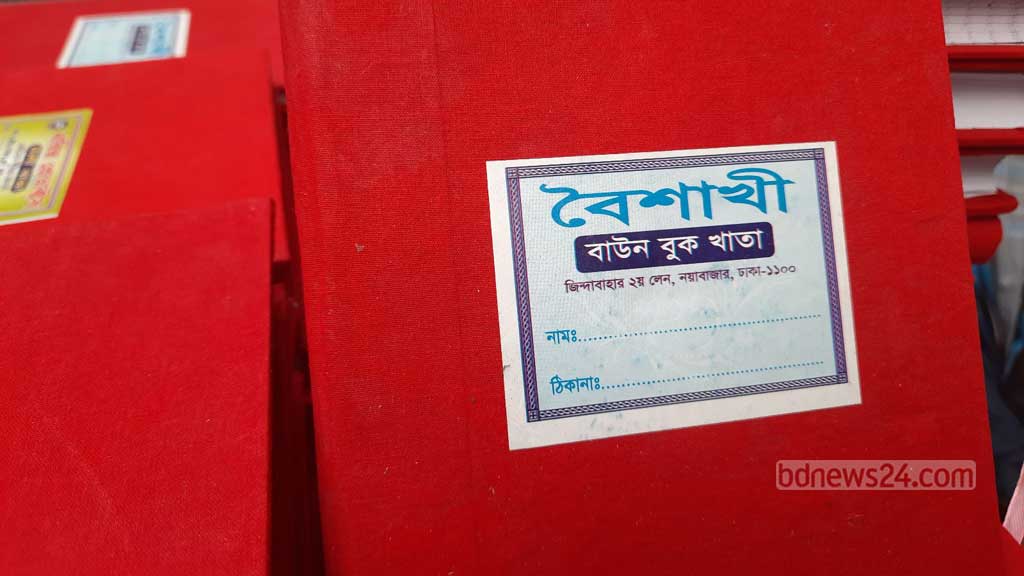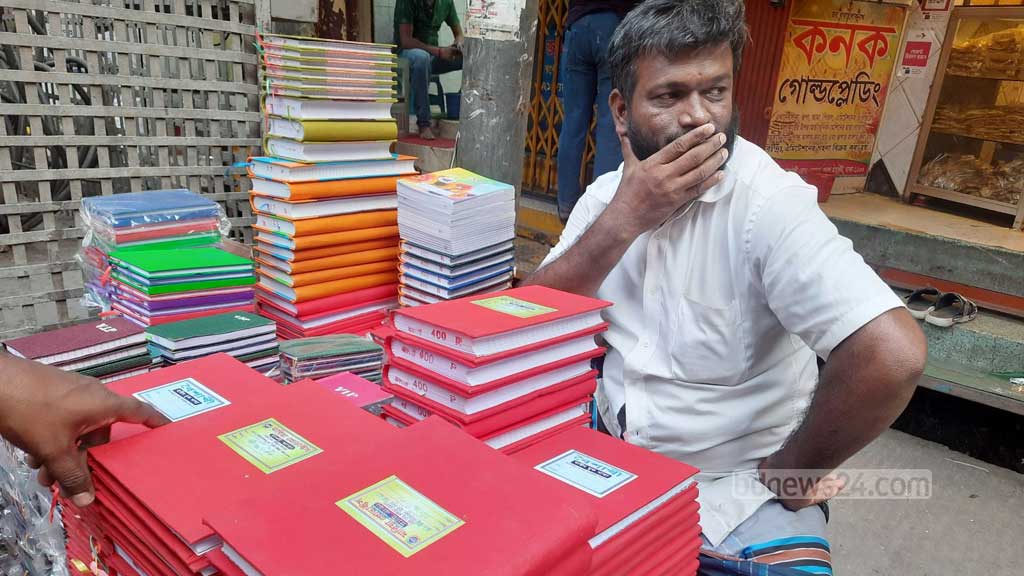Home
+
Many traders in Old Dhaka are set to organise a two-day Halkhata this year

Published : 14 Apr 2025, 03:10 AM
“Halkhata”, the Bengali New Year tradition of settling old debts and opening a fresh ledger, has evolved as customs have changed with the era.
With technology now woven into daily life, mobile phones and the internet have transformed how buyers and sellers communicate.
Resulting in the once colourful Halkhata cards to be a rare sight. Old account details are now shared through simple mobile text messages.
The practise of Halkhata is gradually decreasing. Even then, the gold traders of Old Dhaka’s Tanti Bazar have retained the old tradition.
Halkhata was introduced in 1584 AD to celebrate the Bengali New Year after the introduction of the Bengali year by the Mughal Emperor Muhammad Akbar (also known as Akbar the Great).
The tradition of paying tax to the king’s treasury on the Bengali New Year gradually evolved into the traders’ practise of Halkhata.
The Persian word “Hal” means new. In that sense, Halkhata is the act of settling old accounts and entering names in a new ledger.
The new ledger, bound in red cloth, remains a tradition of the business relationship between the traders and the customers.
Traders in Old Dhaka's Tanti Bazar, Laxmi Bazar, and Shankhari Bazar will celebrate Halkhata or Bengali New Year for two days — Monday and Tuesday.
According to the Christian or Gregorian calendar, Apr 14 is the first day of Boishakh.
On the other hand, according to the Hindu community's calendar, this time Pahela Baishakh falls on Tuesday, Apr 15.
According to the official calendar, Bengali New Year falls on the same day every four years. Due to the different dates, most traders have announced they will celebrate Halkhata on both days this year, while smaller shops or establishments will do so for one day.
Even then, they will “accommodate” known customers on both days.
Tanti Bazar is mainly known for selling gold jewellery, leading to most visibility of Halkhata rituals and paraphernalia in this market.
Mrinal Kanti Sarkar, who has been in the gold business in Tanti Bazar for 45 years, once compared the joy of Halkhata with Eid, to convey the depth of his happiness.
The employee of NG Gold Jewellers told bdnews24.com, “When Halkhata day came, my heart would overflow with joy. Just as Muslims rejoice during Eid, I felt the same happiness.
“Many would visit us, and so did we. I would also invite the ones who didn’t owe us money.

“Those days are long gone. Now there are two counts. One is the government’s and the other is the calendar’s. We, the traders, will hold Halkhata according to the calendar,” he added.
This time, Halkhata will be organised on a small scale by Qayum Jewellers, a business organisation in Tanti Bazar.
Mohammad Robin, owner of the company, said the price of gold on Sunday would be Tk 163,000 per bhori. “How can people afford to make jewellery now at such rates?
“People used to give rings or small necklaces to children on birthdays or special occasions. Now, making a ring costs Tk 25,000 to 30,000. Chains cost even more.”
Robin added, “If we call customers on Halkhata day, it’ll be too expensive for them. There’s no business like before, so we’re not calling everyone—only those we know well. We'll arrange something for whoever comes.”
Every year on the first day of the Bengali New Year, traders traditionally open a new Tally Khata to keep their accounts.

Now, various types of software have started replacing these red-cover ledgers, and their use is gradually declining.
Liaqat Ali, who manufactures and supplies varieties of red-cover ledgers at his factory in Bangla Bazar, has set up a temporary roadside stall in Shankhari Bazar for the occasion.
“Sales are good,” he told bdnews24.com. “But last year was better. With computers now in use, the demand for books has slowed a bit.”
Another trader, Arshad Ali, plans to run his temporary stall for two more days. “I'll keep the shop open until Tuesday,” he said. “Then I’ll take the unsold books back to the factory.”